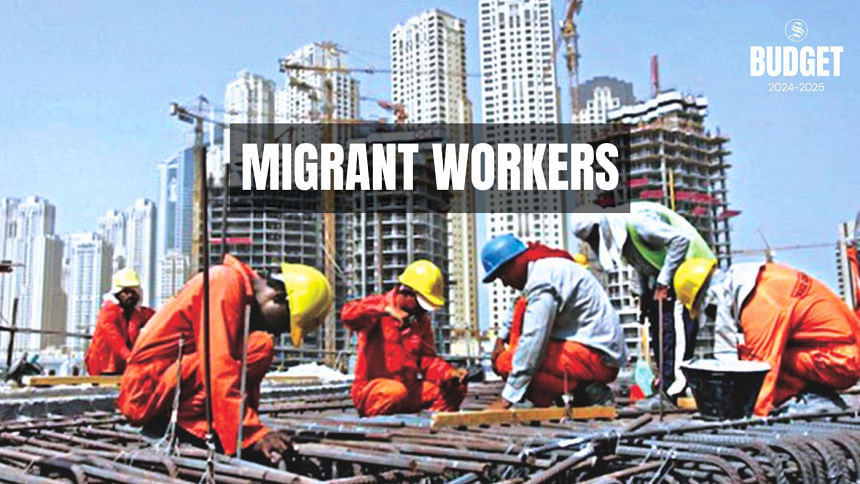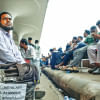They leave with big dreams, only to return broken

Md Iman Mollah, 49, of Manikganj, left for Malaysia six months ago with a dream -- to change his fate and secure a brighter future for his children, wife, and family.
But instead, he returned home broken, his dreams shattered. Imam was paralysed from the overwork. Moreover, not getting the promised salary left him mentally unstable.
On the night of October 25, a fragile Iman arrived at Hazrat Shahjalal International Airport.
For his family, the sight was heartbreaking. The man who had once left with high hopes, now returned as a shadow of himself, carrying only the weight of unfulfilled dreams and a future that now seems more uncertain than ever.
"We don't know what would happen to my father. He stays silent and cannot even recognise us sometimes," Iman's younger son Md Robin Mollah told The Daily Star.
He went to Oman in good health, determined to make a better life for himself and us. But now, he needs constant help just to move around.
Iman first left Bangladesh to seek better fortune in Malaysia 15 years ago. But he had to come back a year ago with physical ailments.
His family treated him with whatever savings they could with the money he sent home.
"As he got better, he decided to go back to Malaysia six months ago, this time on a construction worker visa. But now he returned in a more fragile condition," said Robin, a former madrasa student now desperately seeking work to support his family.
"My family now survives solely on my sister's income. She works at a kindergarten school. We struggle daily to put food on the table, and now we face the additional burden of my father's medical costs," he added.
Iman is not alone.
Over the past five years, BRAC has supported at least 104 Bangladeshi workers, mostly women, who returned from the Gulf, Malaysia, and Turkey after facing abuse. These workers endured physical injuries, mental torture, or sexual exploitation, and many now suffer from severe trauma caused by overwork and underpayment.
Among the returnees, 87 were women and 18 were men, BRAC data shows.
Saudi Arabia accounted for the highest number of cases with 79 returnees, followed by Oman with 12, Qatar with five, and two each from Jordan, the UAE, and Malaysia, as well as one each from Libya, Kuwait, and Turkey.
Layek Miah, 24, from Sylhet's Fenchuganj, is one such tragic case. He went to Oman five years ago, hoping for a better life as a hotel worker.
However, he returned mentally unstable just three days ago.
She faced relentless abuse and is now almost mentally unstable. She can barely work. We don't know what the future holds for her.
BRAC helped reunite him with his family. "He went in good health but now needs constant help just to move," said Siddiq Ahmed, his younger brother. "We don't know how he will survive in this condition," he added.
Female returnees often face the worst conditions. Many have endured severe trauma due to physical and sexual abuse.
A relative of one such woman said her sister returned with multiple health issues, including reproductive complications. "She faced relentless abuse and is now mentally unstable. She can barely work," she added.
Shariful Hasan, associate director of BRAC's Migration Programme, said the actual number of returnees could be four to five times higher.
"Some returnees are mentally unstable, face physical complications, or are pregnant. Many deal with complex issues," he said.
Shariful said there is a lack of structured support for returnees at the airport and called for standard operating procedures (SOPs) to define the roles of government offices.
"It is painful that we cannot provide adequate support for such vulnerable returnees," he added.
Prof Tasneem Siddiqui, founding chair of RMMRU, called the situation heartbreaking.
She urged embassies to collaborate with local Bangladeshi communities abroad to monitor migrant workers and assist them before conditions worsen.
She recommended setting up more shelter homes in host countries for mental health support, ensuring employment for those unable to return to family, and raising international recognition for workers' rights and the children born abroad.
Prof Siddiqui also suggested using the Wage Earners' Welfare Board funds to support these returnees. "We must ensure safe migration and address these challenges urgently," she said.

 For all latest news, follow The Daily Star's Google News channel.
For all latest news, follow The Daily Star's Google News channel. 








Comments